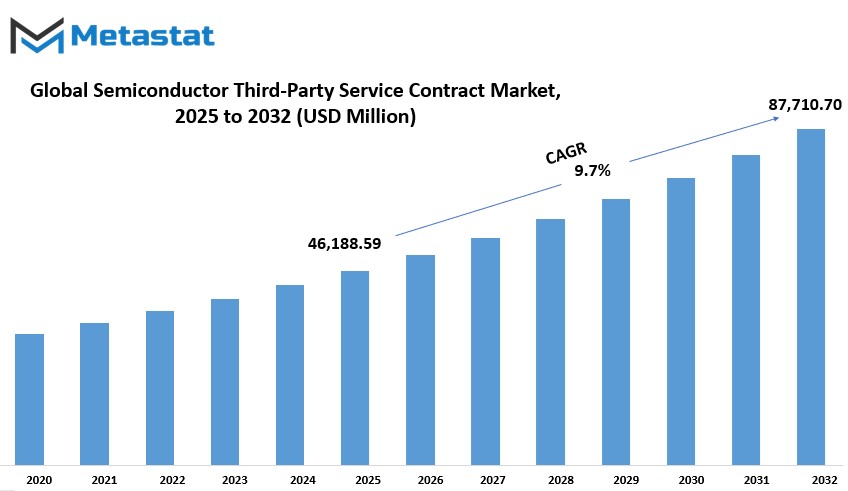MARKET OVERVIEW
The Global Semiconductor Third-Party Service Contract Market It is a critical factor in establishing the semiconductor industry's future and offers supporting services of any type to the producers, designers, and providers. The future is bright as the semiconductor companies try to make optimum use of operations and produce their products smoothly.
As the demand for semiconductor devices increases across several sectors, third-party services handling testing, packaging, assembly, and other special tasks will remain in high demand. In the near future, the semiconductor industry will require a greater need for flexible and efficient service contracts to adapt to the changing technological landscapes. There will be a great dependency on the outsourced service providers due to the need for highly skilled labor and specialized knowledge.
As the advancement in semiconductor technology continues to gain momentum with every passing day through smaller chip sizes, advanced packaging techniques, and increased energy efficiency, companies would look for the service provider that can provide the expert knowledge and resources needed to stay competitive. The Global Semiconductor Third-Party Service Contract market will be crucial in helping these companies meet the growing demand for quality products while not increasing prices, as well as fulfilling all regulatory obligations.
Therefore, the scope of their services will extend from the older manufacturing support services up to the newer high-tech solutions, requiring special equipment as well as technical skill set. Over time, semiconductor companies are likely to consider such contracts more significantly in order to maximize the efficiency of production and reduce the time-to-market for newer products. The direction of this market will also be influenced by technological factors.
More semiconductor companies are going to integrate automation, artificial intelligence, and machine learning into their processes and thus service providers will be compelled to offer solutions that integrate all these innovations. Contract terms are likely to include services that will be focused on system integration, automated systems maintenance, and data analysis as a means to further streamline their operations.
Companies will need such services to continue to maintain competitive advantage as the industry continues along the path of more intelligent and automated manufacturing. One of the factors driving the trend will be the increasing complexity of semiconductor production. The increasing number of applications, from mobile devices to automotive systems and artificial intelligence, will make semiconductor companies continuously innovate and improve their offerings. Third-party service contracts will be the key to ensuring that these advancements can be realized without sacrificing quality or efficiency.
These contracts will provide expertise, which will also address the issues concerning supply chain disruption, regulatory compliance, and overall global market dynamics. Additionally, as the market for semiconductors is becoming more globalized, companies will need to establish strategic partnerships with service providers located in various regions. They can then better the production time scales, costs of operation, and the end product will also answer the call to meet the demanding requirements of various customers from a global spectrum.
The growth in the Global Semiconductor Third-Party Service Contract market will result in more intricate connections between the companies and the semiconductor service providers towards the industry's overall success. The Global Semiconductor Third-Party Service Contract market will remain an essential part of the semiconductor industry's growth. Cooperation between third-party service providers and semiconductor manufacturers would help firms survive in a growingly competitive world with technological innovation and changes in market conditions. The ever-evolving industry brings into the fray those challenges, and these contracts will be all the more important as the industry grows.
Global Semiconductor Third-Party Service Contract market is estimated to reach $87,710.70 Million by 2032; growing at a CAGR of 9.7% from 2025 to 2032.

GROWTH FACTORS
At present, the global semiconductor third-party service contract market is recording decent growth with a few major drivers. Key drivers of the increased growth are a result of increasing outsourcing demands where businesses desire to reduce cost-related operational expenses and focus on core competencies. By outsourcing their operations to third-party service providers, manufacturers will be able to optimize their operations, cut down overheads, and focus on the thing that makes real differences to their businesses. This allows businesses to be on their toes with competition and also adapt quickly with an industry always seeking innovation.
Secondly, the increased semiconductor manufacturing complexity supports the increase in third-party demand. Semiconductors represent processes that call for the usage of sophisticated technologies and high-technological skill. The more the technology is involved in the fabrication of semiconductors, the more complex it gets, making it difficult to internally manage everything about its production. This has seen the involvement of a third-party service provider because they have the skills and resources to do specialized tasks, such as testing and packaging or even research and development. This will ensure that the need for such expertise continues to increase, and thereby fuel the third-party contract market.
Though obvious benefits abound in outsourcing semiconductor services, several drawbacks exist with it. For one, this reliance on external service providers exposes it to a host of possible delays and quality control risks. When manufacturers allow third parties to handle critical areas of production, they may fail to ensure those services meet the internal standards for quality. Problems with delays and quality could potentially disrupt production timetables, which would damage the overall product quality, of course, as a major headache for companies within this highly competitive industry.
Another obstacle that may limit market growth is the high initial setup costs associated with aligning third-party services with a company’s internal processes. Establishing a seamless partnership with external providers often requires substantial investment in technology, training, and process integration. These upfront costs may discourage some companies from outsourcing, particularly smaller firms with limited budgets.
There is, however a great prospect in the market, since third-party advanced service demand is increasingly rising. Some of the chances for growth of the market come with the increased demand for expansion in AI and IoT markets. With the advance in these technologies, there are increasing needs to develop advanced third-party testing and packaging solutions. Increasing deployment of AI and IoT across industries enables semiconductors to forge alliances with third-party providers that are primarily involved in these technologies, thereby aiding the market's growth in the near future.
MARKET SEGMENTATION
By Type
The Global Semiconductor Third-Party Service Contract market is a massive market, which is providing services that support the semiconductor industry. All these services play a very critical role in making sure semiconductor equipment is always running, efficient, and updated. The market has several types of services with distinct roles within the overall ecosystem.
The major segment within the market is Equipment Maintenance Services, which accounts for $10,311.25 million. These services ensure that semiconductor equipment is maintained and repaired to keep it at its best levels. The reason for this is that semiconductor manufacturing is based on high-precision machinery, which may break or degrade over a period of time and may affect the timelines and quality in production.
Another key area within the market is Calibration Services. Calibration ensures that the semiconductor equipment’s measurements are accurate and meet the necessary standards. This process helps prevent errors during manufacturing and ensures that products meet strict quality and safety standards.
Testing and validation services also form part of the semiconductor market. These services are designed to test and verify the functionality of the equipment that has to work correctly in every stage of its lifecycle. It is essential to validate that the concerned equipment is performing correctly to minimize risk and maximize productivity.
Spare Parts and Consumables Management is another segment that helps maintain the flow of operations. The management of spare parts and consumables ensures that companies have all the necessary components to repair or replace equipment when needed. This segment helps reduce downtime by making sure that all the required parts are readily available.
Software Support and Upgrades are also important. Software has to be updated or patched along with advancing semiconductor technology to match the ever-changing demands of the industry. The equipment runs very smoothly and efficiently with the latest features and security measures in place.
End-of-Life Equipment Services offers solutions for managing equipment that is no longer in use or has reached the end of its useful life. It helps companies dispose of or recycle old equipment responsibly, ensuring that environmental standards are met.
Other products available include Assembly & Packaging Services, Logistics & Supply Chain Services, IT & Infrastructure Services. Assembly & Packaging Services facilitate the assembling and packaging of semiconductor components physically, while Logistics & Supply Chain Services ensure materials and products are delivered through the supply chain.
IT & Infrastructure Services address the technological structure related to the semiconductor industry, ensuring network infrastructure and data management systems are maintained. These services, together, form a complete support system for the semiconductor industry, ensuring that equipment remains functional, up-to-date, and ready for production.
By Application
Global Semiconductor Third-Party Service Contract market is used to support a variety of phases in semiconductor manufacturing. It splits up into a number of applications, and each one involves the production process at a specific level. Among the major applications, there is wafer fabrication, the first phase in the production of semiconductors, which involves slicing silicon into thin slices that will be utilized afterwards to compose devices with semiconductor.
Third-party services in wafer fabrication ensure that production is efficient, cost-effective, and of the highest quality. Companies providing these services manage equipment, materials, and processes in this area and are, therefore, an essential part of the overall market. The second most important area of the market is assembly and packaging. Assembly and packaging are procedures that put semiconductor chips into protective cases, thereby preparing them for use in electronic devices.
This stage is very important to ensure that the chips can work well and are safe from physical damage. Third-party services in assembly and packaging are skilled in the handling of materials, designing solutions for packaging, and maintaining high standards necessary for the safe transportation and usability of semiconductors. Testing and inspection is also one of the other significant applications of the market.
This application has focused on ascertaining the quality standards before the semiconductor chips are shipped to the customers. It involves critical testing to check whether the chip works correctly in different conditions. Third-party service providers in this field provide special tools and techniques to detect the defects, and hence, minimize the chances of faulty products being sold in the market and keeping the reputation of the semiconductor manufacturers intact.
Another area is third-party services, where cleanroom management is a very crucial service. Cleanrooms are set aside areas to ensure that the manufacture of semiconductors without dust and other contaminants in manufacturing takes place. The third-party service providers take care of managing and maintaining the environment so that they become free of all types of contaminants, hence providing cleanliness and safety for the products manufactured. This, in turn, results in a quality final product and higher efficiency within the entire manufacturing process.
Lastly, there are automation and robotics changing the semiconductor industry. The combination of these automated systems and robots helps to streamline production, reduce human error, and increase efficiency. Third-party services in the area will help clients with setting and maintaining automated systems to ensure a successful manufacturing process and updated technology. The demand is growing for faster, efficient production, and that's why these services are becoming highly essential.
In brief, the Global Semiconductor Third-Party Service Contract market includes all relevant applications that come together in making the entire semiconductor manufacturing process efficient and of high quality. Third-party service providers are very helpful to companies in maintaining or surpassing high-quality standards and remaining competitive in such a dynamic industry.
By End-user
In reality, the semiconductor industry's market for third-party service contracts worldwide is diversified, segmented by its key end-users, which also include semiconductor manufacturers, foundries, integrated device manufacturers (IDMs), equipment manufacturers, and research institutions, each of them playing a more important role than the other one in the whole semiconductor supply chain. Demand would vary according to their specific need and operation within the supply chain.
Another key set of customers of third-party service contracts comes from the industry of semiconductor manufacture. They actually design and fabricate semiconductor chips. Such an organization usually needs highly specialized services provided by other organizations, and the list usually ranges from maintaining the equipment in production lines, to software-related solutions, up to consulting as means of ensuring optimized production line output. Thus, third-party services assist a semiconductor manufacturer increase their efficiency by minimizing costs in terms of increasing productivity.
Foundries comprise another large section of the industry. A foundry is the firm that fabricates semiconductor chips for other design houses that never built the device but have conceptualized it and do not manufacture it. This foundry usually relies on outsourcing third-party service to keep operating the high sophisticated equipment used for chip fabrication, such as its repair, calibration, and up-to-date systems to keep a foundry business running smoothly on the latest changes in technology.
Integrated Device Manufacturers (IDMs) are another important group in this market. IDMs design, manufacture, and sell semiconductor products all in-house. However, even these companies rely on third-party services for various needs, such as equipment upgrades, outsourcing specific manufacturing tasks, and acquiring specialized expertise that may not be available internally. These third-party services allow IDMs to focus on core operations while enhancing their technological capabilities.
Third-party service providers are sought out by manufacturers that design and create the actual production machinery, where semiconductor chips will be created. The continuous needs of maintenance or troubleshooting can arise with time if their machinery remains nonperformative. Hence, it needs very specific technical skills to run in optimal levels for such companies' operations. Maintaining performance level in these businesses often concerns upgrading and refining such high-quality machine operations needed in semiconductor-based goods production.
Additionally, third-party services demands by research institutions participate in the semiconductor business, which also conduct advanced research and development to advance semiconductor technology. Most of them require third-party testing support, data analysis services, and specialized software tools that can help advance their studies.
The market for third-party service contracts in the semiconductor industry is essential for ensuring that all these different sectors function efficiently and continue to innovate. As semiconductor technology continues to advance, the demand for these services is expected to grow, with each end-user group seeking ways to stay competitive and improve their operations.
|
Forecast Period |
2025-2032 |
|
Market Size in 2025 |
$46,188.59 million |
|
Market Size by 2032 |
$87,710.70 Million |
|
Growth Rate from 2024 to 2031 |
9.7% |
|
Base Year |
2024 |
|
Regions Covered |
North America, Europe, Asia-Pacific, South America, Middle East & Africa |
REGIONAL ANALYSIS
The geography is divided into regions for the global market of semiconductor third-party service contracts, which comprises several key regions to complement the growth and development of this industry. North America includes the United States, Canada, and Mexico. Europe will comprise countries such as the UK, Germany, France, Italy, and other countries in this region that do not fall into these categories. Then there is the Asia-Pacific region, home to most of the world's largest semiconductor companies; this is broken down further into India, China, Japan, South Korea, and many others who contribute to the industry in the area.
It encompasses South America countries such as Brazil and Argentina; the Middle East & Africa include the Gulf Cooperation Council (GCC) countries, Egypt, South Africa, and other parts of the region that are not particularly mentioned. All these regions are highly critical for the semiconductor industry and hold unique advantages addressing the needs of different businesses within the market.
For example, North America possesses a solid technological infrastructure and has a very qualified workforce that can make this area a hotspot for semiconductor research, design, and manufacturing. The Asia-Pacific region is the other area of excellence due to large-scale manufacturing capabilities. China, South Korea, and Japan are the main central points of semiconductor production and assembly.
The demand for third-party services in the semiconductor sector is growing rapidly, and the global market is expanding across these regions. The need for third-party service providers continues to rise in North America and Europe, where advanced technology adoption and high-end research and development are at the forefront. Hence, in Asia-Pacific, third-party service contracts for production and innovations are the means of maintaining flow and responding to the needs of the global marketplace.
The third-party service contract market in semiconductors, a highly diverse regional landscape, presents an important role in tailoring services to fit the demands of each local landscape, all at the same time, taking into consideration the overall interconnectedness of the global semiconductor industry. Thus, businesses have to grow as they will learn to meet each region's specific needs and demands while striving for optimized global performance.

COMPETITIVE PLAYERS
The global semiconductor third-party service contract market is very competitive in nature. This is because of the several leading players providing vital services to semiconductor manufacturing. Major players include ASE Technology Holding Co., Ltd., Amkor Technology, and TSMC, which stands for Taiwan Semiconductor Manufacturing Company. All these companies have gained major contribution status to the market through various services offered such as assembly and packaging, testing, and design.
ASE Technology Holding Co., Ltd. and Amkor Technology are two leaders in the packaging and testing of semiconductors, both critical parts of the semiconductor supply chain. These companies collaborate with semiconductor manufacturers to ensure that final products meet quality standards and perform as desired in their applications. TSMC is a leader in semiconductor foundry services. It is an important player in the industry since it manufactures chips designed by a wide range of companies, from consumer electronics giants to automotive firms.
The other major player, GlobalFoundries, offers foundry services focused on advanced technology nodes for customers that have critical requirements for solutions in the semiconductor industry. Similarly, the services of IC packaging and testing are integrated by JCET Group, which is an essential step in providing high-quality products to the marketplace. UTAC Holdings and Chipbond Technology Corporation are also known in the industry for their packaging and testing services, which play a significant role in overall manufacturing efficiency.
Siliconware Precision Industries Co., Ltd. or SPIL has become a strategic leader in offering semiconductor packaging solutions through innovations of several industries it caters to. Tech Mahindra also comes under this sector, wherein they provide information technology and engineering services. Such firms play important roles in leading digital transformation, such as facilitating optimization of various processes in semiconductors by managing and maintaining supply chain lines and refining designs for end products.
Apart from these companies, Cadence Design Systems, Inc. and Synopsys, Inc. are the leaders in EDA tools that help in designing semiconductor products. Their software solutions are a must for the proper functionality and efficiency of semiconductor chips. Finally, Intertek Group plc provides testing services to ensure that semiconductor products meet the required standards for performance, reliability, and safety.
In summary, the semiconductor third-party service contract market is supported through a diversified set of companies that are each bringing in specific services to fuel innovation and ensure high-quality semiconductor products. These players are important cogs in the complex process of semiconductor manufacturing and distribution, ensuring the market finds continued footing and development.
Semiconductor Third-Party Service Contract Market Key Segments:
By Type
- Equipment Maintenance Services
- Calibration Services
- Testing and Validation Services
- Spare Parts and Consumables Management
- Software Support and Upgrades
- End-of-Life Equipment Services
- Assembly & Packaging Services
- Logistics & Supply Chain Services
- IT & Infrastructure Services
By Application
- Wafer Fabrication
- Assembly and Packaging
- Testing and Inspection
- Cleanroom Management
- Automation and Robotics
By End-user
- Semiconductor Manufacturers
- Foundries
- Integrated Device Manufacturers (IDMs)
- Equipment Manufacturers
- Research Institutions
Key Global Semiconductor Third-Party Service Contract Industry Players
- ASE Technology Holding Co., Ltd.
- Amkor Technology
- TSMC (Taiwan Semiconductor Manufacturing Company)
- GlobalFoundries
- JCET Group
- UTAC Holdings
- Chipbond Technology Corporation
- Siliconware Precision Industries Co., Ltd. (SPIL)
- Tech Mahindra (for IT and engineering services)
- Cadence Design Systems, Inc.
- Synopsys, Inc.
- Intertek Group plc (for testing services)
WHAT REPORT PROVIDES
- Full in-depth analysis of the parent Industry
- Important changes in market and its dynamics
- Segmentation details of the market
- Former, on-going, and projected market analysis in terms of volume and value
- Assessment of niche industry developments
- Market share analysis
- Key strategies of major players
- Emerging segments and regional growth potential








 US: +1 3023308252
US: +1 3023308252






